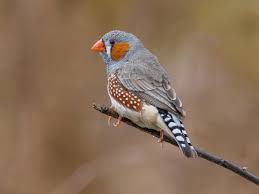
Zebra Finch
Conditions of detention
Zebra finches require a spacious cage or aviary that allows for flight and social interaction. The cage should have horizontal bars for climbing and be equipped with perches, swings, and toys to keep them entertained. It’s important to place the cage in a well-lit area away from drafts and direct sunlight.
Useful Fact: Zebra finches are social birds and do well in pairs or small groups. They thrive in environments where they can interact with other finches and observe human activity.
Nutrition and diet
A balanced diet for Zebra finches includes a high-quality finch seed mix or pellets supplemented with fresh fruits and vegetables. Foods such as spinach, kale, broccoli, and carrots are excellent choices. Millet sprays and egg food can also be offered as treats, especially during breeding and molting periods.
Useful Fact: Grit is not necessary for finches’ digestion but can be provided occasionally to aid in grinding food. Ensure fresh water is available at all times.
Health
Zebra finches are generally hardy birds but can be prone to certain health issues such as respiratory infections, mites, and nutritional deficiencies. Regular observation and maintaining a clean environment are essential for preventing diseases.
Useful Fact: Monitor their droppings for changes in color or consistency, as these can be early indicators of health problems.
Grooming and care
Zebra finches groom themselves by preening their feathers and enjoy bathing. Providing a shallow dish of water for bathing or misting them lightly with water can help maintain healthy feathers.
Useful Fact: Regularly cleaning the cage and providing fresh bedding helps prevent the spread of parasites and bacteria.
Education and training
While Zebra finches are not typically trained like parrots, they can become accustomed to their owner’s presence and routines. Handling should be minimal to avoid stress.
Useful Fact: Finches appreciate a predictable environment and routine, which can help reduce stress and encourage natural behaviors.
Toys and entertainment
Toys are essential for the mental stimulation and well-being of Zebra finches. They enjoy simple toys like swings, mirrors, and bells. It is important to rotate toys regularly to maintain their interest.
Useful Fact: Providing natural branches can encourage climbing and foraging behavior, which are beneficial for physical and mental stimulation.
Safety
Ensure that the cage is free of sharp edges and that the bar spacing is appropriate to prevent escape or injury. Keep them away from toxic substances, including certain household plants and fumes.
Useful Fact: Avoid using non-stick cookware around Zebra finches, as the fumes can be toxic and even fatal to birds.
Accessories
Zebra finches require a variety of accessories for their cage, including perches, food and water dishes, and toys. Accessories should be made from safe materials like untreated wood or stainless steel.
Useful Fact: Natural wood perches of varying diameters can help maintain foot health by preventing pressure sores.
Socialization
Zebra finches are social creatures and thrive in flocks. They should not be kept in isolation for extended periods and benefit from the company of other finches.
Useful Fact: If you have a single Zebra finch, consider providing a companion to prevent loneliness and encourage natural social behaviors.
Travel and Transportation
When traveling with Zebra finches, use a secure and well-ventilated travel carrier. It’s important to keep the carrier covered during transport to reduce stress.
Useful Fact: Familiarize your Zebra finch with the travel carrier by placing it in their living space and allowing them to explore it before any trips.
Behavior and psychology
Zebra finches exhibit a range of behaviors and vocalizations that indicate their mood and health. Understanding these signals is essential for proper care.
Useful Fact: Male Zebra finches are known for their singing ability, which is used to attract mates and establish territory. Females are generally quieter and more focused on nesting.
Legal aspects
In most areas, there are few legal restrictions on keeping Zebra finches as pets, but it is important to ensure that any finches purchased are from reputable breeders or pet stores, and not taken from the wild.
Useful Fact: Always check local regulations to ensure compliance with laws regarding pet ownership and breeding, as some areas may have specific requirements.


